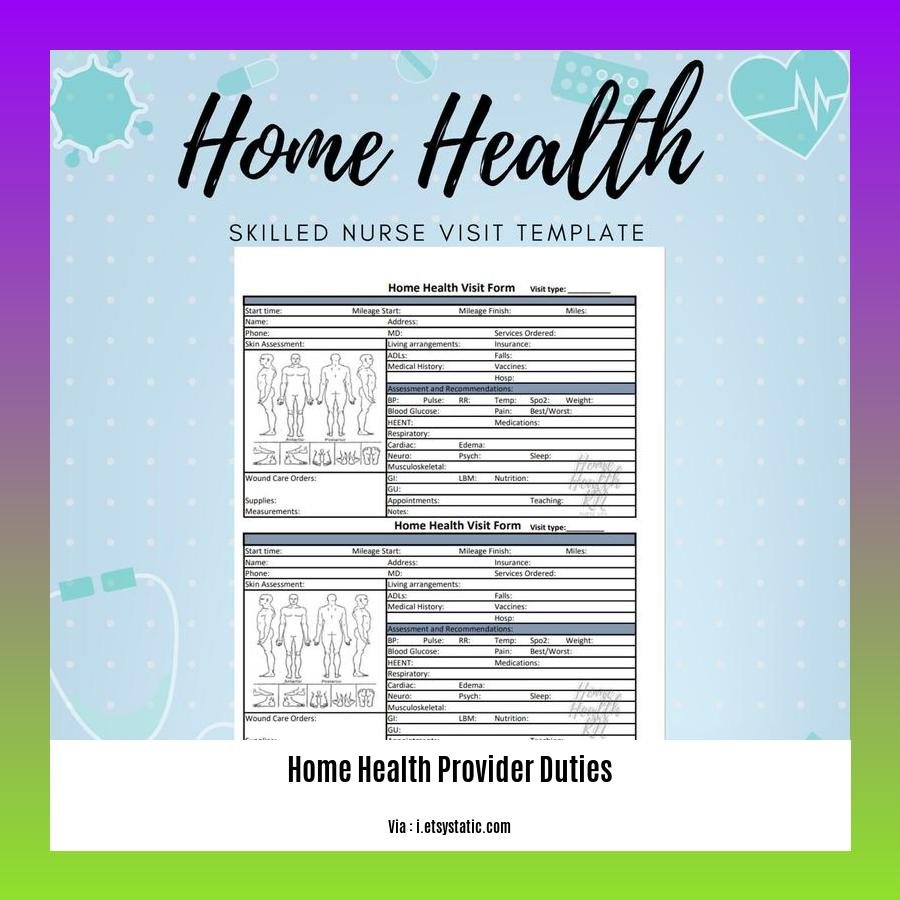Discover the multifaceted role of a Home Health Provider in [Home Health Provider Duties: Providing Compassionate Care and Support in the Comfort of Home]. Learn about the wide range of services offered, from medication management and wound care to personal care and assistance with daily living. Explore the unique challenges faced by chronically ill or disabled individuals and how home health providers navigate these hurdles to maintain their clients’ independence and dignity.
Key Takeaways:
-
Home healthcare providers offer healthcare services in patients’ homes.
-
They perform domestic and household tasks, transport and accompany patients to appointments, administer medications, and assist with personal care activities.
-
Monitoring vital signs, temperature, and respiration, recording the patients’ mental and physical condition, and helping them use specialized equipment are also part of their responsibilities.
-
Home health providers assist in maintaining a prescribed diet and educate the patient’s family on how to care for the patient.
Home Health Provider Duties

Home health providers carry out a wide range of responsibilities to ensure the well-being and comfort of patients in their own homes. These duties encompass healthcare services, domestic tasks, assistance with daily living, and monitoring of patients’ conditions. Here’s a closer look at the key duties of home health providers:
1. Providing Healthcare Services:
-
Administering Medications: Home health providers administer prescribed medications as directed by healthcare professionals. They ensure accurate dosage and timing, monitoring for any adverse reactions.
-
Wound Care: They provide wound care services, including cleaning, dressing, and monitoring for signs of infection.
-
Vital Signs Monitoring: Regular monitoring of vital signs, such as blood pressure, temperature, and respiration, plays a vital role in assessing patients’ overall health.
-
Medication Management: Home health providers manage patients’ medications by organizing, dispensing, and monitoring the proper administration of prescribed medications.
-
Disease Management: They help patients manage chronic conditions, such as diabetes or heart failure, by providing education, monitoring, and support.
2. Performing Domestic and Household Tasks:
-
Meal Preparation: Home health providers prepare nutritious meals according to patients’ dietary needs and preferences.
-
Laundry and Housekeeping: They assist with laundry, light housekeeping, and maintaining a clean and safe living environment.
-
Errands and Shopping: Providers may run errands and make necessary purchases for patients, ensuring they have essential supplies and groceries.
3. Assisting with Activities of Daily Living (ADLs):
-
Personal Care: Home health providers assist with personal care activities, such as bathing, dressing, grooming, and toileting, ensuring patients’ hygiene and comfort.
-
Mobility Assistance: They provide assistance with mobility, such as walking, transferring, or using assistive devices, helping patients maintain their independence.
-
Cognitive Support: Home health providers offer support and assistance with cognitive tasks, such as memory enhancement, problem-solving, and decision-making.
4. Monitoring and Reporting on Patients’ Condition:
-
Monitoring Mental and Physical Condition: They closely observe patients’ mental and physical condition, noting any changes or concerns.
-
Reporting to Healthcare Professionals: Home health providers communicate patients’ conditions and any observed changes to healthcare professionals, ensuring timely interventions.
-
Documenting Patient Records: They maintain accurate and detailed records of patients’ health status, treatments provided, and progress made.
5. Providing Emotional and Social Support:
-
Companionship: Home health providers offer companionship and emotional support, reducing feelings of isolation and loneliness.
-
Advocacy: They advocate for patients’ rights, ensuring they receive appropriate care and services.
-
Education and Support: Home health providers educate patients and their families about health conditions, medications, and self-care techniques.
In essence, home health providers play a pivotal role in ensuring the well-being and comfort of patients in their own homes. They provide a wide range of services, from healthcare and domestic tasks to assistance with daily living and emotional support. Their dedication and compassion make a significant difference in the lives of those they serve.
-
Discover a world of comprehensive home health care services within the state of Texas by clicking home health in texas, leaving no stone unturned in your pursuit of quality healthcare.
-
Need to reach our home health services? Simply click home health phone number to connect with our friendly representatives who are eager to assist you and provide answers to all your inquiries.
-
If you seek guidance on navigating home health policies and procedures, look no further. Click home health policies and procedures to access our extensive library of resources, ensuring you stay informed and compliant.
-
Join our passionate team and embark on a fulfilling career as a home health provider. Explore the detailed home health provider job description and discover the rewarding opportunities that await you in making a difference.
Patient Assessment and Care Planning
I’m sure you’re aware that delivering the right care begins with a proper understanding of a patient’s needs and circumstances. Patient assessment and care planning play a vital role in ensuring efficient and patient-centric care. Think of it as the cornerstone of a successful home healthcare plan!
Key Takeaways:
-
User-centric Approach: Patient assessment and care planning focus on the specific needs, goals, and preferences of each individual.
-
Collaborative Effort: Care plans are created and reviewed regularly in partnership with the individual, their families, and other members of the healthcare team.
-
Comprehensive Evaluation: Assessments cover medical, psychosocial, functional, and environmental factors to gain a holistic understanding of the individual’s condition.
-
Tailor-made Care Plans: Care plans are customized to meet the unique requirements of each individual. It includes measurable goals, interventions, and a timeline for monitoring progress.
-
Regular Reviews and Adjustments: Care plans are subject to regular reviews and adjustments based on changes in the individual’s condition, preferences, and treatment outcomes.
-
Effective Communication: Clear communication among the healthcare team, the individual, and their families is crucial for successful implementation and monitoring of care plans.
-
Cultural Sensitivity: Culturally sensitive care plans respect the individual’s cultural background, beliefs, and values.
Step-by-Step Guide to Patient Assessment and Care Planning:
- Initial Intake and Assessment:
-
Gather relevant information through patient interviews, medical history review, physical examination, and functional assessments.
-
Identification of Needs and Goals:
-
Collaborate with the individual, family, and healthcare team to identify the person’s healthcare needs, goals, and preferences.
-
Development of the Care Plan:
-
Create a personalized care plan that outlines specific interventions, frequency of care, and expected outcomes.
-
Regular Monitoring and Evaluation:
- Continuously monitor the individual’s condition, progress, and response to interventions.
-
Make adjustments to the care plan as needed.
-
Ongoing Communication:
-
Maintain open communication with the individual, family, and healthcare team to ensure that all parties are informed of progress and any changes.
-
Review and Revision:
- Regularly review the care plan and make revisions based on the individual’s changing needs and preferences.
Remember, patient assessment and care planning is a dynamic process that requires ongoing evaluation and adjustment to ensure the best possible outcomes for individuals receiving home healthcare services!
[Citations]
Health.gov.au
Caregiverlist.com
Collaboration and Communication: Essential Ingredients in Home Healthcare

Effective teamwork and open communication are paramount for home health providers striving to deliver exceptional care. When we prioritize collaboration and communication, we promote seamless care coordination, enhance patient outcomes, and create a positive experience for all parties involved.
Key Takeaways:
- Connecting Multidisciplinary Teams: Foster collaboration among physicians, nurses, therapists, social workers, and caregivers to ensure a comprehensive and coordinated care plan.
- Open Channels: Establish clear communication channels to facilitate timely sharing of patient information, updates, and concerns among healthcare professionals.
- Patient-Centered Care: Engage patients and their families in the decision-making process, actively listening to their preferences and concerns.
- Effective Documentation: Maintain accurate and detailed patient records, ensuring continuity of care and facilitating effective communication among healthcare providers.
- Virtual Platforms: Utilize technology to facilitate virtual consultations, remote monitoring, and secure messaging, improving accessibility and convenience.
Teamwork
As a home health provider, it’s crucial to collaborate closely with other healthcare professionals involved in a patient’s care. This may include physicians, nurses, therapists, dieticians, social workers, and more.
Why Collaboration Matters:
- By working together, we can create a comprehensive care plan that addresses the patient’s needs from multiple perspectives.
- It fosters a culture of open dialogue, helping us identify and address challenges promptly.
- A collaborative approach ensures that the patient receives the best possible care.
Communication
Clear and timely communication is another cornerstone of effective home healthcare. To ensure successful collaboration, it’s essential to:
-
Establish Open Lines of Communication:
-
Encourage open and frequent communication among the healthcare team.
-
Use a variety of communication channels, including phone calls, emails, and virtual meetings.
-
Keep Detailed Records:
-
Document all patient interactions, assessments, and care plans in detail.
-
Maintain accurate and up-to-date records of the patient’s medical history and current condition.
-
Foster Trust and Respect:
-
Build strong relationships with patients and their families by demonstrating empathy, compassion, and respect.
-
Listen actively to their concerns and preferences.
-
Coordinate Care:
-
Collaborate with other healthcare providers to develop a coordinated care plan that meets the patient’s individual needs.
-
Ensure smooth transitions between different care settings.
-
Emergency Preparedness:
-
Have a clear plan in place for handling emergencies.
- Communicate this plan to the patient, their family, and other healthcare providers.
Virtual Platforms
In today’s digital age, virtual platforms offer new opportunities for effective collaboration and communication in home healthcare.
-
Remote Monitoring:
-
Utilize remote patient monitoring tools to track vital signs, medication adherence, and other health parameters.
-
Share data with other healthcare providers in real time.
-
Virtual Consultations:
-
Conduct virtual consultations with physicians, specialists, and other healthcare professionals.
-
Provide telemedicine services to patients who live in rural or underserved areas.
-
Electronic Health Records (EHRs):
-
Use EHRs to maintain patient records, track care plans, and communicate with other healthcare providers.
- Ensure that EHR systems are interoperable to facilitate seamless data sharing.
By leveraging virtual platforms effectively, we can improve access to care, reduce costs, and enhance the quality of care for homebound patients.
Conclusion
Effective home healthcare depends on collaboration and communication. By working together as a team and communicating effectively, we can provide patients with the best possible care and help them maintain their independence and quality of life.
Sources:
- Professional Communication and Team Collaboration
- Roles, Responsibilities, and Implications of Communication and Collaboration Among Health Care Professionals
Ethical and Legal Considerations
As a home health provider, daily work often revolves around providing compassionate care and support to individuals in the comfort of their homes. However, it’s crucial to remember that ethical and legal considerations are an integral part of the job, guiding actions and decisions. Let’s delve into some important aspects to keep in mind:
Autonomy and Informed Consent:
- Respecting the autonomy of the individuals we serve means honoring their right to make decisions about their own care. This includes providing clear and comprehensive information about treatment options, potential risks, and benefits. Informed consent ensures that individuals can make choices aligned with their values and preferences.
Confidentiality and Privacy:
- Maintaining the confidentiality of patient information is paramount. Adhering to privacy laws and regulations is essential, as is safeguarding sensitive data and communications. Building trust with clients relies heavily on respecting their right to privacy.
Non-discrimination and Equal Treatment:
- Providing care with compassion and respect means treating all individuals equally, regardless of race, ethnicity, religion, gender, sexual orientation, or any other factor. Non-discrimination ensures that everyone receives the same high-quality care and support, fostering an inclusive environment.
Cultural Sensitivity:
- Understanding and respecting cultural differences is crucial in providing culturally competent care. Being sensitive to diverse cultural beliefs, values, and practices helps tailor care plans that align with individuals’ unique needs and preferences, promoting better outcomes and satisfaction.
End-of-Life Care and Palliative Care:
- When faced with end-of-life situations, ethical considerations become even more critical. Respecting patients’ wishes and supporting their decisions regarding end-of-life care is paramount. Providing palliative care that focuses on symptom management, comfort, and emotional support ensures a dignified and compassionate approach to end-of-life care.
Professional Boundaries and Dual Relationships:
- Maintaining professional boundaries is essential to avoid conflicts of interest and potential harm to clients. Establishing clear boundaries ensures that care is provided in a professional and objective manner. Avoiding dual relationships, such as personal or financial ties, helps maintain trust and integrity in the caregiving relationship.
Key Takeaways:
- Respecting autonomy and obtaining informed consent ensures that individuals make choices aligned with their values and preferences.
- Maintaining confidentiality and privacy builds trust and safeguards sensitive patient information.
- Offering non-discriminatory and equal treatment promotes an inclusive environment where everyone receives high-quality care.
- Cultural sensitivity in caregiving ensures that plans align with individuals’ unique needs and beliefs.
- Approaching end-of-life care and palliative care with compassion and respect ensures patients’ wishes are honored.
- Upholding professional boundaries and avoiding dual relationships maintains trust and integrity in the caregiving relationship.
Relevant URL Sources:
- Ethical Considerations in Home Health Care
- Legal and Ethical Considerations in Home Health Care
FAQ
Q1: What are the primary duties of a home health provider?
A1: Home health providers are responsible for providing healthcare services, performing domestic and household tasks, transporting patients, administering simple medications, assisting with personal care activities, monitoring vital signs, and observing and recording patients’ mental and physical conditions.
Q2: What is the importance of communication and collaboration in home health care?
A2: Communication and collaboration are crucial in home health care to ensure that care and services align with the individual’s needs, preferences, and goals. Effective communication among healthcare providers encourages teamwork, collaboration, and helps prevent errors.
Q3: Can home health providers administer medications?
A3: Yes, home health providers can administer simple prescribed medications as part of their duties. They are trained to safely and accurately administer medications according to the doctor’s orders.
Q4: What is the role of a home health provider in monitoring the patient’s condition?
A4: Home health providers are responsible for monitoring the patient’s vital signs, temperature, respiration, and overall condition. They observe and record any changes or concerns and report them to the healthcare team.
Q5: How do home health providers assist with personal care activities?
A5: Home health providers assist patients with activities of daily living, such as bathing, dressing, grooming, and toileting. They provide personalized care to ensure the patient’s comfort and well-being in their own home.










